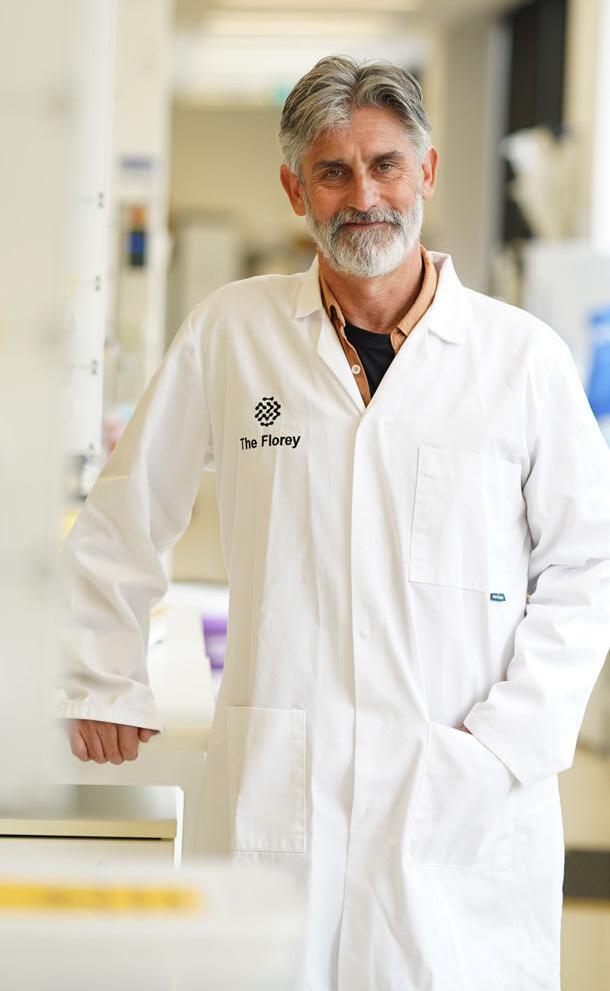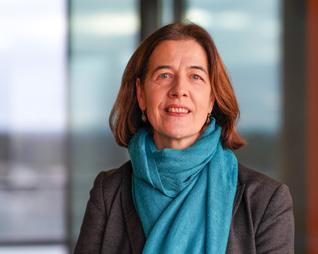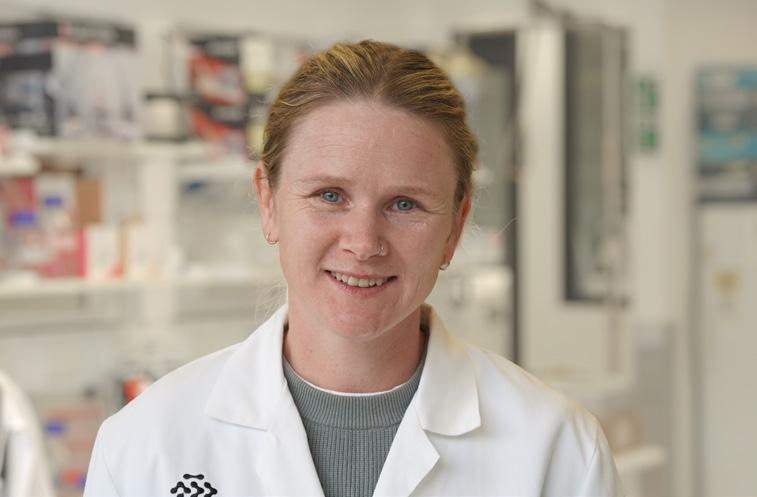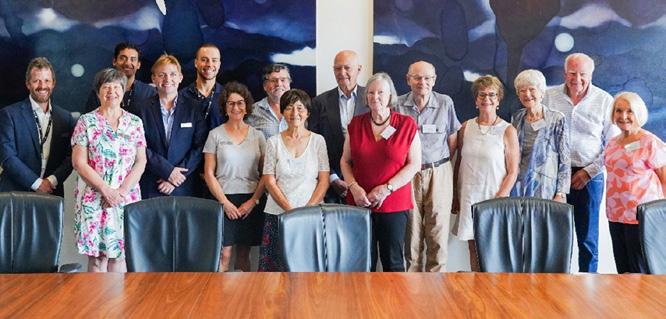Brain Matters



Welcome to the latest issue of Brain Matters, where we share the remarkable research underway at The Florey.
We read about research progress on multiple fronts – from uncovering links between an increased rate of genetic change in brain lesions and progression in multiple sclerosis (MS), which could bring us closer to new treatments (see p.3), to a discovery that gives us a better understanding of binge drinking in females, with the potential to inform care for women experiencing alcohol use disorder (see p.5).
In this issue, we also highlight the vital contributions of women
researchers at The Florey working in areas that predominantly affect women’s health. Their advocacy is not only empowering greater representation of women in research but helping shape better health outcomes for women.
We recently launched The Florey 2024 Impact Report, which features powerful stories of discovery and the real-world impact our research is making for people with lived experience of neurological and mental health conditions. To read the report you can access it via the QR code within this edition or on our website.
Many thanks for your interest in Florey research. Thank you also to our generous donors whose support helps our researchers continue their important work. I hope you enjoy this issue of Brain Matters, and that these stories fill you with a shared sense of optimism for the future.

Executive Director & CEO,

Phrenix Therapeutics, an innovative biotech company focused on developing next-generation medicines for psychiatric and neurological disorders, has secured major seed investments from venture capital firms, Curie.Bio and Brandon Capital.
Founded in 2022, Phrenix Therapeutics is the first spinout from Monash University’s Neuromedicines Discovery Centre (NDC) and operates in partnership with The Florey.
Led by its co-founders from the Monash Institute of Pharmaceutical Sciences (MIPS), Professor Chris Langmead and Dr Greg Stewart, and The Florey’s Associate Professor Jess Nithianantharajah, the company
is developing new medicines for psychosis and cognitive impairments related to schizophrenia. This new funding will help them advance their pipeline of innovative treatments closer to clinical trials.
By combining cutting-edge drug discovery technologies with neurobehavioral testing, they aim to develop better treatment options for patients experiencing psychiatric or neurological disorders such as schizophrenia.
The Florey’s Executive Director and CEO, Professor Peter van Wijngaarden, said it is tremendous to see leading venture capital funds from Australia and the US uniting to support the development of next-generation treatments for
brain and mental health conditions.
“Phrenix is the result of a visionary collaboration between Monash University and The Florey, and we look forward to continuing this partnership to move discoveries from the laboratory to the clinic to improve lives,” he said.
Co-founder Associate Professor Nithianantharajah said: “At Phrenix, we are driven by the urgent need for new and effective treatments for brain and mental health conditions.
“This funding will accelerate our research, translating cutting-edge neuroscience into real-world solutions. We are excited to take this critical step forward in reimagining how we develop next-generation medicines for brain and mental health.”
A Florey study published in the journal Nature Neuroscience has identified that inflammation – long associated with multiple sclerosis (MS) – appears to cause increased mutations in the DNA of neurons that is linked to MS progression. Multiple sclerosis is a progressive neurological disease that affects 33,000 Australians. About one-third of people living with MS have a progressive form of the disease, which current treatments do not address effectively.
Led by Florey Associate Professor Justin Rubio, Head of the Neurogenetics Group, the study examined MS brain lesions, visible as spots on MRI scans, which are areas of brain inflammation.
The team from The Florey Institute and University of Melbourne focused on somatic mutations, which are
not inherited but occur over time in neurons during ageing. Mutations can disrupt a cell’s normal function or survival.
The researchers compared mutations in neurons from the brains of people who did and did not have MS. They found that by the age of 70, neurons in MS lesions have around 1,300 more mutations than normal neurons.
Bioinformatician and first author on the paper, Dr Allan Motyer, was involved in the research during his time at the University of Melbourne’s Integrative Genomics and School of Mathematics and Statistics.
“Not only did we find there are more mutations in MS lesions, but they are of different types to those seen in normal ageing, indicating that a distinct molecular process causes mutations in MS,” Mr Motyer said.
Associate Professor Rubio and team are working to build on this important finding and investigate new treatment avenues for progressive MS. According to

The Florey has launched its 2024 Impact Report, celebrating important discoveries made by our researchers over the past year. This report showcases powerful stories from people with lived experience of conditions, and how their lives have been transformed by Florey research, as well as some of our leading researchers who dedicate their work towards studying these conditions.
Discover the incredible stories of Richard Mulcahy who spent decades living with an uncontrollable tremour until his procedure with an MRI-guided

Associate Professor Thevathasan talks to Richard Mulcahy during his procedure
focused ultrasound at The Florey; the story behind PhD student, Montanna Waters, and her motivation to study epilepsy, and more.
co-author on the paper and Florey researcher Professor Trevor Kilpatrick, this research is significant because it is the first to show that inflammation could be connected to the death of neurons in MS via accelerated mutation of the genetic code.
“Once we know for certain what molecular disruptions kill the neurons, we hope to find a way to save them, or keep them alive for longer to minimise progressive disease,” he said.
“It’s not a treatment for progressive MS yet, but it brings us closer to one.”
The researchers are grateful to MS Australia and to all families who donated the brain tissue of their loved ones to science, enabling this research to take place.


What can change for women’s health outcomes and care when women are represented and supported in the scientific field today?

Dr Francesca Alves, Dr Nicole Jenkins and Lauren Ursich are at different stages in their careers and are currently studying areas and conditions that largely affect women.

Dr Francesca Alves, Translational Neurodegeneration Group
Dr Francesca Alves is investigating the underlying mechanisms of energy deficiency in myalgic encephalomyelitis/chronic fatigue syndrome (ME/CFS).
Around 75 per cent of people who live with ME/CFS are women.
“This illness can affect people of all ages, all demographics, but what we know is that the main cohort of people who have this illness are women,” Dr Alves says.
“We don’t know the causes of why this illness predominantly affects women, but we know that it’s
misunderstood, and there’s a lot of stigma associated with it.”
Recently, Dr Alves’s research into ME/ CFS received grant funding from the Judith Jane Mason & Harold Stannett Williams Memorial Foundation to look into parallels between Alzheimer’s disease and extreme fatigue.
“Our research will provide valuable insights into what drives symptoms in ME/CFS, paving the way for new treatments and better care for patients with ME/CFS.”

Dr Nicole Jenkins, FeBI Technologies
Dr Nicole Jenkins is CEO and cofounder of FeBI technologies, a start-
up company working to revolutionise the diagnosis and management of iron disorders, which affect 1 in 5 women in Australia.
Recent research found that up to 35 per cent of women who have an iron deficiency were initially misdiagnosed and treated for the wrong condition.
“I’ve been working in the lab on the importance of iron in ageing and neurodegeneration for a number of years, but I also had an iron disorder. It took 7 years for me to be correctly diagnosed and treated.”
The experience helped Dr Jenkins understand the clinical challenges that come with the diagnosis and management of iron status. These challenges are prevalent especially for people who have chronic health conditions.
“At FeBI Technologies our aim is to improve the diagnosis and management of iron disorders using quantum technology,” Dr Jenkins says.
When Dr Jenkins returned to work after a 9-year break to raise her family, she worked on providing career support for women researchers returning to science after a career break.
“What I’m seeing is fantastic science, great grantsmanship, people really worthy of funding who are just missing out,” Dr Jenkins says.
“I find that heartbreaking, as I know that there is amazing science that could be being done across the board, particularly by women.”
Dr Jenkins says she would love to see more philanthropic donations or improved grant funding, which would enable more of this research to take place.
“We are driven by that passion to make the world a better place,” Dr Jenkins says. “That’s the driving force behind everything that we do.”

Lauren Ursich, Addiction Neuroscience Group
Lauren Ursich is studying how addiction affects the female brain. She currently works closely with Dr Leigh Walker, senior researcher at The Florey, studying how sex differences modulate anxiety and binge-drinking behaviours.
Their team is leading our research into excessive alcohol consumption and alcohol use disorders in women by including female models in their research.
“Leigh is an incredible scientist, a great leader and a really great person to work with, but there is so much power in seeing your identity represented in leadership, particularly in science,” Lauren says.
“It was once I saw my identity in her leadership, as a woman and a queer woman, that’s when I’ve really grown as a scientist and leader into my research and my career.”
Through their research, the team is working to uncover the underlying biology of addiction in the female brain, which can lead to creating more targeted therapies.

With rates of alcohol misuse and alcohol use disorder in women rising, a study from The Florey has found a new pathway in the brain related to binge drinking in females, potentially opening a new way to help women with alcohol use disorder.
In research led by Dr Leigh Walker – published in Nature Communications – the team set out to discover whether hormone differences between males and females can explain sex differences in excessive alcohol consumption.
The team focused on the ‘centrally projecting EdingerWestphal’ (EWcp), a part of the midbrain that scientists recently discovered receives information from gut hormones that may drive excessive alcohol consumption. It is only beginning to be understood.
“Working with mice, we found that switching off the receptor that tells the brain it is hungry, specifically in the EWcp, reduced binge drinking in female, but not male mice,” Dr Walker said.
“This knowledge adds to a growing body of evidence that the female and male brains are fundamentally different and understanding these differences may help provide more tailored treatments for women and people assigned female at birth.”
Dr Walker said sex as a biological variable has only recently gained traction as a critical factor in addiction.
“Most animal research and drug development is built around identifying and testing therapies in males. But it’s important to prioritise research on the neural mechanisms contributing to alcohol use disorder in females.”
The study’s first author Amy Pearl said understanding sex differences is vital for developing effective treatment strategies.
“Men have historically had higher rates of alcohol use, misuse and alcohol use disorder compared to women.
However, these rates have converged significantly over recent decades, driven mainly by an increase in risky drinking and alcohol use disorder in women,” Ms Pearl said.
“Better understanding of the biological differences between male and female brains better equips us for developing more targeted treatments.”
The Florey is proud to announce the latest round of grants awarded to advance research across dementia, Parkinson’s disease, multiple sclerosis and more.
Professor Ashley Bush
New Alzheimer’s treatments targeting amyloid show promise, yet improvements are still needed. Professor Bush aims to explore new biomarkers and therapies beyond amyloid through preclinical studies, imaging, and clinical trials. The funding will also support Professor Bush to work on improving diagnostic tests for Alzheimer’s disease and discover new treatments.
Dr Pratishtha Chatterjee
Biomarker advancements have shifted dementia diagnosis from clinical opinion to biological methods, accelerated by Alzheimer’s disease-modifying therapies. Dr Chatterjee aims to develop new biomarkers for non-Alzheimer’s dementias, such as dementia with Lewy bodies. Her goal is testing new biomarkers in Australian memory clinics and refining them based on feedback from clinicians.
Dr Niamh Moriarty
Parkinson’s disease affects more than just movement, but current dopamine treatments do not effectively address other symptoms. Dr Moriarty aims to improve neural repair using stem cell-derived dopamine cell therapies for Parkinson’s. Her focus will enhance the survival, integration and function of neural grafts in Parkinson’s models. These efforts will provide new insights into treating Parkinson’s symptoms and the role of cell therapies.
Dr Carlos Gantner
Parkinson’s and related disorders involve abnormal alpha-synuclein clumping in cells. Genetic factors account for much of disease risk but their role in disease initiation, progression and prognosis is unclear. Dr Gantner aims to decode these genetic risks using stem cells and gene editing. The goal is generating new Parkinson’s therapeutic avenues.






MEGA-Heart, a research project led by The Florey and University of Melbourne to reduce brain and kidney injury after cardiac surgery, has received $4.9 million over 5 years from the Federal Government’s Medical Research Future Fund (MRFF) Grant.
Florey critical care researchers will undertake a multi-site study to test a treatment that could prove a game changer for patients undergoing heart surgery.
Lead Investigator Professor Yugueesh Lankadeva said up to half of all heart surgery patients experience postoperative delirium and 30 per cent of patients have acute kidney injuries.
“These issues can lengthen or complicate recovery, or may even prove fatal in some cases

Ms Michele Binder
Ms Michele Binder, Head of The Florey’s Multiple Sclerosis and Myelin Repair Group, together with her team, discovered that a type of immune cell in the brain (microglia) can promote the repair of myelin to protect nerves. Using this finding, the team aims to develop a new therapy to protect neurons in people who have MS and reduce their chance of future disability.
Professor Trevor Kilpatrick
Professor Trevor Kilpatrick, neurologist-researcher at The Florey, will lead a project that investigates how MERTK – a risk gene for MS – affects disease progression, and identify which patients may benefit from treatments targeting this protein. The team will examine blood samples from people who have MS, and laboratory models to see how changes in MERTK influence MS symptoms, such as weakness and loss of coordination.
Dr Vivien Li, neurologist-researcher at The Florey, and her team aim to develop a new way to treat MS using a person’s blood immune cells. By treating these cells with antiinflammatory signals, and re-administering them to the person living with MS, the team hopes to target and dampen the immune cells that cause inflammation and nerve cell damage in MS.
Associate Professor Rubio and his team will build upon the findings from their recent study into faster mutation rate in neurons (p 2). This discovery suggests that certain genetic changes in the brain may influence how MS progresses. The team will use advanced methods to analyse genetic mutations, gene expression, and regulation in the brain. The hope is that this work could pave the way for new therapies that protect brain cells and slow MS progression.
– yet no therapies are available.”
Professor Lankadeva said the project centres on administering a “mega-dose” of a novel formulation of sodium ascorbate that was recently developed and patented by The Florey to treat heart surgery patients in operating theatres and intensive care units.
He said for the past 3 years the team, with experts in many fields – cardiologists, endocrinologists, cardiac anaesthetists, cardiac surgeons, clinical perfusionists, intensive care physicians, nephrologists and neuropsychiatrists – had developed methods for studying the effects of heart surgery and cardiopulmonary bypass on brain and kidney health in sheep.
“We aim to follow this project with larger scale




clinical trials to transform the management of patients undergoing heart surgery and ultimately, improve brain and kidney health outcomes,” Professor Lankadeva said.
The clinical trial will recruit patients and involve perioperative and critical care physicians from Austin Health, the Victorian Heart Hospital, The Alfred, Royal Melbourne Hospital and Royal Adelaide Hospital.
“Our compelling preliminary data in sheep undergoing cardiopulmonary bypass suggests our formulation of sodium ascorbate reduces neuroinflammation, which may prevent delirium. It also appears to reduce kidney inflammation, hypoxia and cell death in the inner region of the kidney – the renal medulla – which may prevent acute kidney injury.”
Members of The Florey Society recently gathered for a boardroom briefing on our world-first drug screening technology using patient stem cells.
The presentation, delivered by Professor Brad Turner, Head of Neurodegeneration and Immunology research, focused on the use of stem cell technology to recreate motor neurone disease ‘in-a-dish’ – using mini-brains.
Coupled with The Florey’s stateof-the-art robotics platform, this revolutionary new technology enables large-scale drug screening of potential treatments for MND.

The Florey Society recognises supporters who have kindly committed a gift in their Will for The Florey’s brain research. If you have included The
Florey in your Will, or intend to when it’s time to renew or make your Will, please let us know so you can be invited to Florey Society events.
To let us know or to request our Gifts in Wills guide, contact Nola Wilmot, Bequests Manager on 03 9035 9710 or email nola.wilmot@florey.edu.au
Our first public lecture of 2025 was held in recognition of World Epilepsy Day, with experts and those with lived experience coming together to highlight severe childhood epilepsy and the way forward with the latest medical research.
Thanks to Mel Anderson, Dr Katherine Howell, Associate Professor Snezana Maljevic, Stuart Place, and Professor Chris Reid for
Florey researchers have been engaging with local community groups and sharing their expertise on neurological disorders.
Over the past few months, Dr Abdel Ali Belaidi, Professor Anthony Hannan, Associate Professor Snezana Maljevic, and Dr Niamh Moriarty have delivered insightful presentations to various groups including Probus and U3A.
L to R: Mel Anderson, Prof Chris Reid, A/Prof Snezana Maljevic, Dr Katherine Howell, and Stuart Place


From genes to hope. Watch the lecture

joining us at The Florey to discuss this important area of research, and for sharing their insights and personal experiences.
Topics ranged from Alzheimer’s disease and treatment of Parkinson’s disease using stem cell transplantation, to closing the gender gap in science and health, and the neuroscience of mental health. These activities highlight our commitment to public education and community engagement.
If you would like to request a research presentation for an upcoming community event, please contact philanthropy@florey.edu.au

Acknowledgement of Country The Florey acknowledges the Traditional Owners of the land on which we work, the Wurundjeri people of the Kulin Nation. We pay our respects to their Elders past and present. The Florey is committed to the aims, principles and actions of marra ngarrgoo, marra goori: The Victorian Aboriginal Health, Medical and Wellbeing Research Accord.